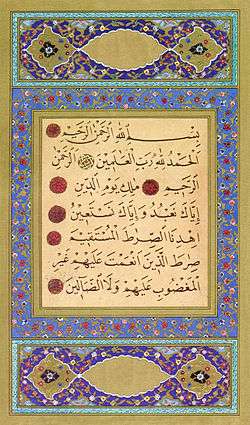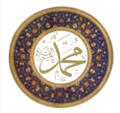Hattat Aziz Efendi
| Hattat Aziz Efendi | |
|---|---|
| Born |
1871 Maçka, Ottoman Empire |
| Died |
1934 (aged 62–63) Istanbul, Ottoman Empire |
| Known for | Calligraphy |
Hattat Aziz Efendi (born 1871, Maçka – August 16, 1934, İstanbul) (Ottoman Turkish: خطاط عزیز افندی) was an Ottoman calligrapher.
He was born in Maçka in 1871. His family moved to Istanbul, the Ottoman capital during Russo-Turkish War (1877–78). Aziz Efendi completed his primary education in 1885 and started to learn calligraphy from Ahmed Arif Effendi of Plovdiv (known more commonly as "Bakkal" -the grocer-) and he also studied at Hat Mektebi (Calligraphy School). He graduated in 1894 and continued to practise under the supervision of Muhsinzade Abdullah Hamdi Efendi until 1896.
In 1921, King Fuad of Egypt has invited him to Cairo, where he transcribed the Quran and gilded the result.[1] After completing his mission, he remained in Egypt, where he worked as a teacher and contributed to the establishment of schools to improve Arabic fonts.
He returned to Istanbul in 1932, where he died two years later.
Two of his calligraphic panels are hanging in the Grand Mosque of Bursa, Turkey. He transcribed 11 copies of the Quran in his lifetime, a number of hilyas and other textual compilations.[2]
Examples of works
-

The first sura of the Qur'an, al-Fatihah, in the hand of Hattat Aziz Efendi
-

The name "Muhammad" in traditional Thuluth calligraphy, possibly inspired by a 19-th century disk in the Hagia Sophia
References
External links
- A profile of Hattat Aziz Efendi by Muhittin Serin. (in Turkish)
- Muhittin Serin: Hattat Aziz Efendi, Istanbul (1988, 1999), ISBN 975-7663-03-4, OCLC 51718704
- Sâmiha Ayverdi, İbrâhim Efendi konağı, Kubbealti Publishing (2009), ISBN 9789757663478, 147ff. (p. 147 has a portrait photograph)